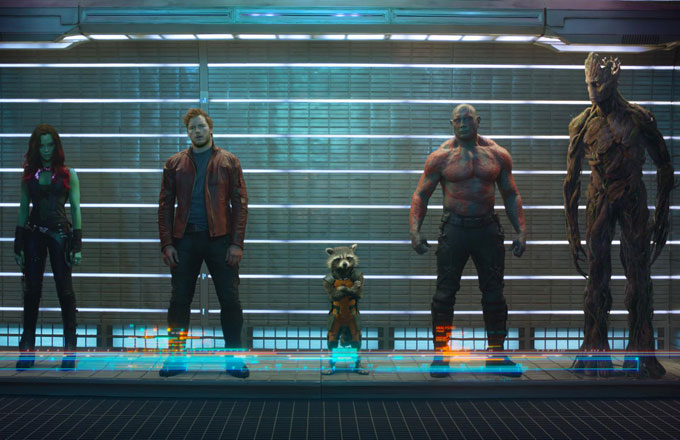
Fact: Nicole Perlman is a geek. No, not in the sense of the word printed on Hot Topic tees. She's a geek in the truest sense. A long time math and science aficionado, the 33-year-old Boulder, Colorado, native channeled her passion into screenwriting, working on Challenger, about a physicist on the Challenger shuttle, and Universal's Neil Armstrong biopic. Neither went into production.
Just as she was growing frustrated with the lack of opportunities to write fun, popcorn summer movies, Marvel came along and offered her a spot in their writer's program, which allowed scribes to choose a property to develop for two years. She chose Guardians of the Galaxy. And now, that movie, her first-ever completed project, opens in theaters nationwide tomorrow.
Perlman spoke to Complex about the challenges of developing Guardians of the Galaxy, the sexualization of fangirls, and being the first woman to ever write a Marvel movie.
Had you read any of the Guardians of the Galaxy comics before?
I was much more into graphic novels. When I first started working for Marvel, they gave me a huge stack of binders to take home and familiarize myself. When I chose Guardians, they basically said, “Here are several decades' worth of backstory.” I didn't realize how complex the worlds are and how all these characters have been around longer than I’ve been alive. So I really went through it, parsing out which characters to use, because there are a lot more Guardians than there are representatives of the name, and choosing which ones had the more compelling storylines.
How long did it take you to develop this?
I worked on it for two-and-half-years years by myself. Originally, the very first version that I pitched Marvel was set in the 1970s—there’s a different crew of characters from the 1970s. Then we decided that the most recent 2008 Dan Abnett/Andy Lanning-written comic book, sort of a reboot of Guardians, had character dynamics that were more fun, so we chose that for the movie.
How did science and screenwriting collide for you?
I come from a very nerdy family. I grew up with a lot of rocket scientists in the neighborhood hanging out at my house for a science fiction book club. I’m from Boulder, Colorado, so there are a lot of aerospace companies over there. My dad and I bonded over Star Trek: Generations. I just find that stories about science or scientists tend to explore really interesting subjects. Guardians of the Galaxy is obviously not based on real science, but there’s still this sense of wonder about space that I think our parents had. It felt more real to our parents. Then, people were walking on the moon. I feel like our generation still has that hunger for those kinds of out-there, wonderful stories, but we don’t have as much of an outlet.
It's a little more difficult for women to convince people that they know what they’re talking about in regards to science fiction or science.
You went to school at NYU's Tisch for screenwriting and film, but is science something you studied as well?
I haven’t studied it, but I’m involved with it very much right now. I won the grant for science and film from Tribeca, and because of that I forged a network of scientists and a lot of my stories have introduced me to astronauts and astrophysicists. I’m on a committee now in Los Angeles called Science and Entertainment Exchange, which is about bringing scientists and entertainers together to basically cross-pollinate and create more stories that are based on scientific fact.
But really it’s about generating new content. It’s about getting people who are making movies and television to get excited about all the stories they don’t know are happening in this world.
Did you have people in mind for the cast when you were writing it?
I didn’t have a say in the casting process, but I always thought Zoe Saldana would be perfect for Gamora, so I was really happy when she accepted it. The character of Rocket, he’s so specific and I know that they had a really hard time figuring out who they wanted for that part. In my head, I always saw him as somebody with more of a rough, Danny DeVito kind of voice, but I’m terrible at casting, and Bradley Cooper’s done an incredible job. He brought so much heart and soul and humanity to a furry little creature. And Chris Pratt, I never had any idea how perfect he was for the part.
What would you say sets Guardians of the Galaxy apart from other superhero movies?
One of the things that Marvel does really well is that they try to take the superhero genre and do something different each time. When they did the first Captain America, it was one of the first superhero period pieces. What they’re doing with Guardians is a science fiction comedy that's not taking itself too seriously. It’s very wacky and offbeat. There are very few good science fiction comedies out there; I think that Galaxy Quest did it really well. Guardians can be in that niche.
Growing up, what were your favorite fantasy or sci-fi works?
Ray Bradbury was my hero as a kid and I got to meet him a couple times which really solidified that. He was just one of those absolutely on-fire genius people who always just radiated warmth and creativity. In terms of fantasy, I loved the Robert Jordan Wilcox movies and, of course, George R.R. Martin as well, in terms of writing. For movies, Galaxy Quest is a big influence, and I think James Cameron does everything well, so he’s been somebody I look up to a lot. In terms of television, I loved Firefly.
What were the biggest challenges that you faced trying to get yourself out there?
It's a little more difficult for women to convince people that they know what they’re talking about in regards to science fiction or science. There’s the conception that there aren’t as many fangirls as there are fanboys and it doesn’t inspire this kind of passion in women that it does in men. But there are plenty of women who are dedicated to this stuff; they fall in love with it, too. There's a way of viewing women in this genre that’s hard to get past. You have to work twice as hard not to be glossed over.
Do you think that can change?
I think so. It's no longer considered weird for a girl to be just as interested in science fiction as a guy. It’s still unusual, but as more women are becoming scientists and are getting into that field, the perception is what’s changing. Perception always lags behind the reality.
The thing that really helps is showing women in a light onscreen where they're smart and not a caricature. For example, Natalie Portman’s character in Thor—I was one of the uncredited writers on Thor, the first one—and that was really important to Marvel to show that. In the comic, Jane was a nurse, but the studio wanted to have a positive portrayal of female scientists, and there just aren’t that many. They tend to be pin-up characters. Obviously Natalie Portman is beautiful, but she’s smart and she’s active and she’s working on something. More portrayals of women scientists or women who are fangirls level the playing field a little bit.
1.

What I see happening now is that when women are fangirls, they become sexualized and they become sex symbols for fanboys, which undermines them.
Exactly. It’s not the airheaded, screaming, Beatle-mania kind of thing. If you go to comic conventions, sure, there are women dressed up sexy, but they are dedicated to it. They fall in love with the story just as the guys do. People just love the characters and they want to embody them.
In terms of scientists, if you compare the scientists in the James Bond movies, they’re just sex objects. Now, I think that we’re getting more fair and realistic portrayal of women. But it’s a slow process and I’m hoping that we become a little bit more mainstream. Honestly, women like movies that have strong characters and are interesting and funny—the things that anybody likes a good movie for.
I feel like one of the things that has happened, unfortunately, is that genres have become assigned to gender.
Absolutely. And honestly, I do think that things are starting to blur a little bit. There’s always going to be the Transformers movies, and there’s going to be very middle-of-the-line romantic comedies, but we do get romantic comedies that are funny and risqué that tend to draw men and women. There’s a commonality there that people like to go see a good movie, and I hope the Guardians will be that as well. It’s about friends, it’s about family, and it’s about relationships with characters, but it’s funny and it also has great action scenes.
Who are your favorite female characters out there right now?
In terms of shows that are on the air right now, Arya Stark. Total badass—I love Arya Stark. She is fantastic and so is Daenerys. They're two really strong female characters that don’t really fall into any stereotype in Game of Thrones. I love female characters who are one step ahead of the game, who are plotting, so I really like the character of Mellie on Scandal. That's my guilty pleasure. Oh, and I love Claire from House of Cards, another plotting woman. I know it’s a little bit of a stereotype, the Lady Macbeth type, but I really think they transcend those characters. Those characters are great, smart women who can be antagonists, but you also understand why they’re doing what they’re doing.
Tara Aquino is the Complex Pop Culture editor. Read about her Guardians of the Galaxy love on her Twitter feed.

